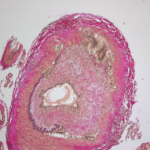NEW YORK (Reuters Health)—Clinical outcomes of rheumatoid arthritis (RA) are similar with abatacept and tocilizumab treatment, but the factors that predict efficacy differ for the two agents.
“The recommendations for RA treatment from the U.S. and EU describe the use of abatacept and tocilizumab as first-line biologics along with anti-TNF (anti-tumor necrosis factor) inhibitors,” Dr. Yoshiya Tanaka, from the University of Occupational and Environmental Health, Kitakyushu, Japan, told Reuters Health by email. “However, there is limited evidence on how to choose between these biological products.”
Abatacept targets T cells, whereas tocilizumab targets interleukin-6, and both are used in patients whose disease has proven refractory to methotrexate.
Dr. Tanaka’s team used a propensity score-matched analysis to compare clinical outcomes of abatacept and tocilizumab treatment of 102 patients in each group and sought to determine the predictive factors of the efficacy of each treatment.
Retention rates at 52 weeks were similar for abatacept (71.6%) and tocilizumab (68.6%). Discontinuation for inadequate effect was more common with abatacept (22.5%) than with tocilizumab (16.7%), according to the Aug. 5 online report in Annals of the Rheumatic Diseases.
Patients experienced similar improvements in Simplified Disease Activity Index (SDAI), Health Assessment Questionnaire Disability Index (HAQ-DI), and Clinical Disease Activity Index (CDAI) with abatacept and tocilizumab treatment.
In contrast, the improvement in DAS28-ESR (the 28-joint count disease activity score-erythrocyte sedimentation rate) was greater with tocilizumab than with abatacept.
Lower baseline SDAI and higher baseline rheumatoid factor titer predicted better CDAI outcomes of abatacept treatment, whereas previous use of a biological agent and lower baseline HAQ-DI score predicted better tocilizumab outcomes.
“These factors should be considered when choosing one of these drugs,” Dr. Tanaka said. “Thus, this report may contribute (to) progress in ‘precision medicine’ in the field of RA.”
The Ministry of Health, Labor and Welfare of Japan, the Ministry of Education, and Culture, Sports, Science and Technology of Japan partially supported this research. Dr. Tanaka reported several relationships with pharmaceutical companies, including Bristol-Myers Squibb, which markets abatacept at Orencia.



